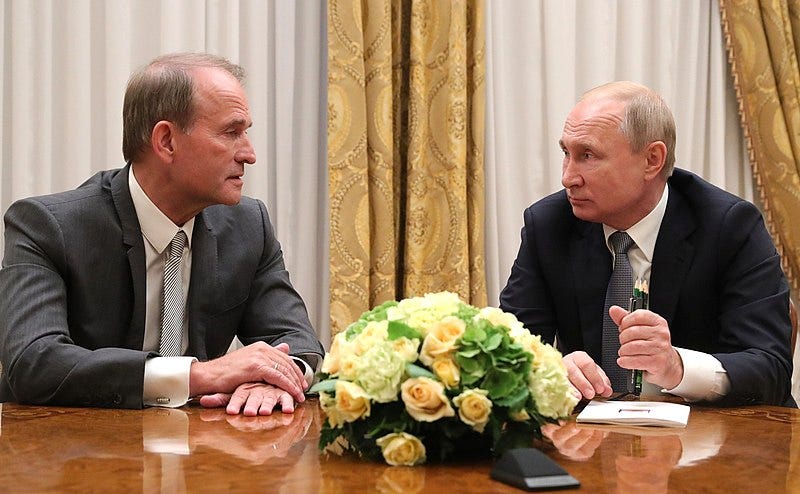Ukraine: the FSB's Suez crisis
How Russian failings mirror Britain's retreat from the Middle East
Viktor Medvedchuk and Vladimir Putin in 2019 (Kremlin.ru, CC 4.0).
While researching an organisation profile on Russia’s domestic intelligence agency, the FSB, I’ve come across an interesting critique by journalist Andrei Soldatov of its role in the beginnings of the Ukrainian conflict in 2014.
While Russia’s main foreign intelligence agency is the SVR, the FSB’s Fifth Service has responsibility for the former Soviet republic considered as part of Russia’s ‘near abroad’ of which Ukraine is among the most important.
Soldatov argues that in discharging this responsibility, the FSB focused on ruling elites, at the expense of political developments among the mass of the population.
Oddly enough, this aspect of their work is remarkably similar to the style of British intelligence during the collapse of the British Empire. In the 1950s, British agents in Egypt tried to their very last to compromise the monarchy, whereas U.S. agents were already working with the "free officers" of Egyptian leader Gamal Abdel Nasser, ultimately leading to the Suez Crisis of 1956. At the same time, the corporate cultures of the British Secret Intelligence Service and the FSB are so different that this single unexpected similarity can have only one explanation: The intelligence services of imperial powers tend to have the same biases toward their former colonies (ref 1).
Although Sodatov was writing in 2014, the flaws he describes seem to have been even more apparent in the invasion of 2022. According to the Washington Post, the FSB placed excessive faith in political networks associated with opposition politician Viktor Medvedchuk.
Unlike other Ukrainian figures, Medvedchuk was in direct contact with Putin, according to officials who cited monitored communications. His was the most prominent voice in a chorus of Kremlin allies assuring Moscow that Zelenskyy was weak, that his government would collapse and that Russian forces would be welcomed by the Ukrainian people, officials said (ref 2).
Perhaps the best account of the British precedent Soldatov describes is in the Middle Eastern chapters of Stephen Dorril’s history of MI6. According to Dorril, the MI6 station in Egypt informed Anthony Eden that the ‘army was loyal to the King’ even as preparations for the 1952 coup reached the ears of other British observers, such as the MP Julian Amery (ref 3, p.601). MI6 was similarly wrongfooted by the 1958 overthrow of the monarchy in Iraq, where ‘it committed a classic intelligence blunder by recruiting agents among its allies and not its opponents’ (ref 3, p.68).
The FSB may have been tempted into a similar mistake by the fact that the Ukrainian security apparatus shared its own KGB roots. The Ukrainians themselves seem to have believed that Russian penetration was ubiquitous.
Some of Ukraine’s online supporters in the West have sought to trace the roots of Russian behaviour to the role of the Grand Duchy of Muscovy as a vassal of the Mongols. Soldatov’s article shows that more contemporary, if perhaps less congenial, comparisons are available, ones that are more relevant to those global audiences that have not yet committed themselves to either side in the Russo-Ukrainian War.
References
Ref 1: Andrei Soldatov, The True Role of the FSB in the Ukrainian Crisis, Moscow Times, 15 April 2014.
Ref 2: Greg Miller and Catherine Belton, Russia’s spies misread Ukraine and misled Kremlin as war loomed, Washington Post, 19 August 2022.
Ref 3: Stephen Dorril, MI6: Inside the Covert World of Her Majesty's Secret Intelligence Service, Fourth Estate Limited, 2000.




